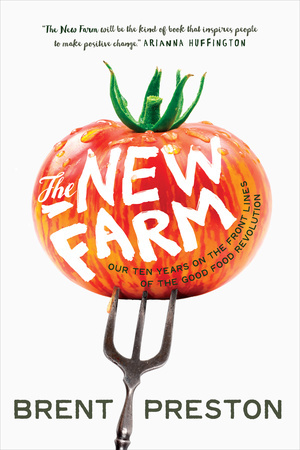
The New Farm: our ten years on the front lines of the good food revolution by Brent Preston
Brent and Gillian Preston had lived and worked all over the world, but eventually moved home to Toronto, Canada to get married and start their family. They loved living in downtown Toronto until they had 2 small children. They realized that they wanted their children to grow up closer to the land. On somewhat of a whim they bought 100 acres with a rundown farmhouse and decided to actually start a farm. It took almost 7 years before they made a profit and could pay off all their debt, they almost lost their marriage and their minds, but were able to turn things around on all fronts and build a sustainable, organic farm that actually supported their family financially, as well as raising money and donating produce to local food banks and shelters. In this book Preston is honest about how hard starting and running the farm was - physically, mentally, and emotionally, but how it was all worth it once they finally rounded the financial corner and were profitable. He does a great job of showing the realities of running a small farm start-up, but also gives enough hope that the whole book isn't doom and gloom horror stories. There are also quite a few laugh out loud stories and moments in the book. Any business has ups and downs and you make mistakes, but when you're doing something worthwhile it's worth it. A wonderful book that will make you appreciate your local lunatic farmers even more.
Some quotes I liked:
"Our farm is proof that small-scale, sustainable farming is a viable alternative. It's a place of community, where chefs, activists and foodies gather to plot the overthrow of all things evil: industrial agriculture, the rat race, high-fructose corn syrup. Our farm is the centre of gravity around which we have built a happy, meaningful and productive life for ourselves. And most importantly, our farm is a testament to the power of the good food movement to radically change our food system from the ground up." (p. 11)
[A conversation with a chef about their prices] "His rant ended with a blunt demand. 'I'm paying over fifty bucks for a box of your salad. I can get the same organic mix from California for less than half that. You have to reduce your price.' That was too much. 'The California mix is not the same as our salad,' I snapped. 'Ours looks and tastes better, it's fresher, it lasts way longer, and it has all kinds of varieties that they can't put in the California mix because they can't be harvested with their mechanical cutters.' I was getting really fired up. 'Has anyone ever come into your restaurant and said, 'Why should I pay fourteen bucks for a burger when I can get the same thing at McDonald's for three?' Of course they haven't, because you burger is better.' Fuck it, I thought. There's no way I'll ever be able to sell at a price that will make everyone happy, so I may as well double down. 'If you really think our salad is the same as the cheaper stuff, then you should buy the cheaper stuff, because even if we cut our price by 30 percent, ours would still be more expensive and we would be out of business. We love working with you, and we really want to keep you as a client, but we aren't going to lower our price.'" (p. 174)
[On dealing with interns on the farm] "There's a common tendency to attribute character flaws to generational deficiencies; it's easy to say that our interns felt entitled and were soft and averse to hardship because they were millennials, but that's probably bullshit. I think twenty-somethings have been entitled, soft and adverse to hardship for quite a few generations. Almost all our interns were incredibly conscientious and hardworking. But they were all in their twenties. They had a lot of feelings. They had many whims. They did a lot of stupid things." (p. 201-2)
"Creating a pesticide that works by making the whole plant toxic, including the part we eat, struck both Gillian and me as a profoundly bad idea. But industrial agriculture seems to double down on bad ideas." (p. 207)
"Globalized commodity markets and razor-thin margins meant fewer and fewer farmers and bigger and bigger farms. 'You're part of a tiny little segment of agriculture that is moving in the right direction,' Gerald told me. 'The rest is hurtling in the opposite direction, as fast as it can.'" (p. 214)
"Our industrial food system is destroying our environment, hijacking our climate, making us fat and sick and unhappy. It's a huge, overwhelming, complex, multi-faceted problem, but the good news is that there is a huge, complex, multi-faceted movement underway to fix things. Right now, all over the world, farmers and activists and chefs and ordinary people are harnessing the power of food to confront the big, intractable problems we face. Idealistic young people are growing food in poor urban neighborhoods. Organizations like The Stop are fighting inequality and loneliness one meal at a time. Farmers are producing beautiful, nutritious food in a way that enhances rather than destroys their environment. Eaters are making a new system possible simply by choosing to buy good food. All of these people are actively and deliberately building an alternative food system, each and every day." (p. 275)
Some quotes I liked:
"Our farm is proof that small-scale, sustainable farming is a viable alternative. It's a place of community, where chefs, activists and foodies gather to plot the overthrow of all things evil: industrial agriculture, the rat race, high-fructose corn syrup. Our farm is the centre of gravity around which we have built a happy, meaningful and productive life for ourselves. And most importantly, our farm is a testament to the power of the good food movement to radically change our food system from the ground up." (p. 11)
[A conversation with a chef about their prices] "His rant ended with a blunt demand. 'I'm paying over fifty bucks for a box of your salad. I can get the same organic mix from California for less than half that. You have to reduce your price.' That was too much. 'The California mix is not the same as our salad,' I snapped. 'Ours looks and tastes better, it's fresher, it lasts way longer, and it has all kinds of varieties that they can't put in the California mix because they can't be harvested with their mechanical cutters.' I was getting really fired up. 'Has anyone ever come into your restaurant and said, 'Why should I pay fourteen bucks for a burger when I can get the same thing at McDonald's for three?' Of course they haven't, because you burger is better.' Fuck it, I thought. There's no way I'll ever be able to sell at a price that will make everyone happy, so I may as well double down. 'If you really think our salad is the same as the cheaper stuff, then you should buy the cheaper stuff, because even if we cut our price by 30 percent, ours would still be more expensive and we would be out of business. We love working with you, and we really want to keep you as a client, but we aren't going to lower our price.'" (p. 174)
[On dealing with interns on the farm] "There's a common tendency to attribute character flaws to generational deficiencies; it's easy to say that our interns felt entitled and were soft and averse to hardship because they were millennials, but that's probably bullshit. I think twenty-somethings have been entitled, soft and adverse to hardship for quite a few generations. Almost all our interns were incredibly conscientious and hardworking. But they were all in their twenties. They had a lot of feelings. They had many whims. They did a lot of stupid things." (p. 201-2)
"Creating a pesticide that works by making the whole plant toxic, including the part we eat, struck both Gillian and me as a profoundly bad idea. But industrial agriculture seems to double down on bad ideas." (p. 207)
"Globalized commodity markets and razor-thin margins meant fewer and fewer farmers and bigger and bigger farms. 'You're part of a tiny little segment of agriculture that is moving in the right direction,' Gerald told me. 'The rest is hurtling in the opposite direction, as fast as it can.'" (p. 214)
"Our industrial food system is destroying our environment, hijacking our climate, making us fat and sick and unhappy. It's a huge, overwhelming, complex, multi-faceted problem, but the good news is that there is a huge, complex, multi-faceted movement underway to fix things. Right now, all over the world, farmers and activists and chefs and ordinary people are harnessing the power of food to confront the big, intractable problems we face. Idealistic young people are growing food in poor urban neighborhoods. Organizations like The Stop are fighting inequality and loneliness one meal at a time. Farmers are producing beautiful, nutritious food in a way that enhances rather than destroys their environment. Eaters are making a new system possible simply by choosing to buy good food. All of these people are actively and deliberately building an alternative food system, each and every day." (p. 275)

A Wrinkle in Time by Madeline L'Engle (Books & Banter book club)
I actually read this for the first time in college in a children's literature class. I remembered the vague storyline, but obviously I really only remembered the first few chapters. As an adult I didn't love the book. Meg was somewhat annoying and the story seemed more skimmed over than fleshed out, but when it was originally published in 1963 I'm sure it was ground-breaking - sci-fi with a female main character?! And it IS a children's book, so it's not going to be as detailed as an adult sci-fi novel. I knew Madeline L'Engle was a Christian, but I didn't remember how blatantly Christian the story is. It's good (God) vs. evil with love being the powerful force than can only defeat the evil IT. And it's funny because I had a hard time reading IT as "it" instead of I.T. (like Information Technology). Overall, it was a quick read, but like many other books I loved as a child it's definitely a different experience reading it as an adult. It will be interesting to see what my book club thinks about this one.
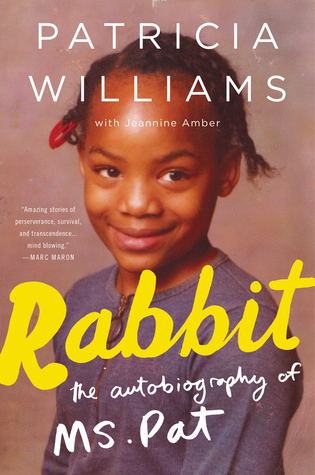
Rabbit: the autobiography of Ms. Pat by Patricia Williams
Patricia "Rabbit" Williams grew up in the projects of Atlanta during the crack epidemic. Her grandfather ran an illegal moonshine house and her mother taught her to roll drunks for their money before she could read. As the youngest of 5 children Rabbit never had any advantages and had 2 children by the time she was 15. By 16 she was running a highly successful drug ring and was able to support herself and her children, albeit illegally. When she was caught and sentenced to prison she vowed to change her life, but growing up in a family with generations of hustlers and addicts she didn't know anything but that life. A few people throughout her life helped her at the right times to get her life on track. Once she found comedy she knew she had found her true calling. Surviving her childhood and then telling her story shows that with a little help anyone can turn things around. Her story is equally shocking and heartbreaking, but very inspiring.
Some quotes I liked:
"Mama always had a quick temper. But she was a tiny woman, barely one hundred pounds, and with all us kids getting big, it was getting harder for her to whoop our asses like she used to. Instead, when she'd get mad because we left the dishes in the sink, she'd reach into the side pocket of her painter's pants, grab her little .22 pistol, and shoot into the air. 'I told you to clean the gotdamn dishes!' POP POP POP! Mama fired that pistol the way other parents raise their voice. Every time she got aggravated, we feared for our lives. I used to wonder, If we so poor, where the hell you getting all these bullets from?" (p. 39)
[On going into the drug business with a friend] "I wasn't sure junkies would go for his corny-ass look and all this hospitality. But it turns out they loved it! Duck quickly got himself customers, repeat customers, and word-of-mouth customers. 'Crackheads is people too,' Duck said with a shrug, when I asked him why he treated junkies so nice. 'Treat them how you want to be treated. Besides,' he added, 'good customer service is how you beat out the competition.'" (p. 107)
[On buying the outfit to bury her mother in Rabbit thinks pajamas are the best bet since she's now asleep forever] "That Saturday, Mama lay in her coffin with a full face of heavy makeup, her Jheri curls glistening with activator. The funeral director had dressed her carefully in the outfit I'd provided. She had on a thigh-high peach-colored satin nightie with a matching floor-length robe trimmed in white lace. The set had come with a matching garter, which I could see had been placed neatly on Mama's thigh, right above her fake leg. I was pleased with my selection. It looked exactly like something Katherine Chancellor would wear on The Young and the Restless. Mama always used to say, 'I wish I had that bitch's money.' Seeing her dressed up in fancy lingerie, I couldn't help but think it looked like Mama had finally made it. As I stood by the casket, Dre stepped up beside me. For a few minutes the two of us stood there in silence, our heads bowed over Mama's lifeless body. Then I heard Dre whisper my name. 'Rabbit,' he said, 'why Mama wearing these ho clothes? She look like she on her way to sell pussy in hell.'" (p. 120)
"When most folks think about the problems of growing up in the hood, they think about what it must feel like to be poor, or hungry, or to have your lights cut off. The struggle nobody talks about is what it feels like to be invisible, or to know in your heart that nobody cares. Mama didn't want to be famous; she wanted to be seen. All those years I thought we were so different, but when I stepped onstage and saw all those facing smiling back at me, I realized Mama and I craved the same thing." (p. 207)
Some quotes I liked:
"Mama always had a quick temper. But she was a tiny woman, barely one hundred pounds, and with all us kids getting big, it was getting harder for her to whoop our asses like she used to. Instead, when she'd get mad because we left the dishes in the sink, she'd reach into the side pocket of her painter's pants, grab her little .22 pistol, and shoot into the air. 'I told you to clean the gotdamn dishes!' POP POP POP! Mama fired that pistol the way other parents raise their voice. Every time she got aggravated, we feared for our lives. I used to wonder, If we so poor, where the hell you getting all these bullets from?" (p. 39)
[On going into the drug business with a friend] "I wasn't sure junkies would go for his corny-ass look and all this hospitality. But it turns out they loved it! Duck quickly got himself customers, repeat customers, and word-of-mouth customers. 'Crackheads is people too,' Duck said with a shrug, when I asked him why he treated junkies so nice. 'Treat them how you want to be treated. Besides,' he added, 'good customer service is how you beat out the competition.'" (p. 107)
[On buying the outfit to bury her mother in Rabbit thinks pajamas are the best bet since she's now asleep forever] "That Saturday, Mama lay in her coffin with a full face of heavy makeup, her Jheri curls glistening with activator. The funeral director had dressed her carefully in the outfit I'd provided. She had on a thigh-high peach-colored satin nightie with a matching floor-length robe trimmed in white lace. The set had come with a matching garter, which I could see had been placed neatly on Mama's thigh, right above her fake leg. I was pleased with my selection. It looked exactly like something Katherine Chancellor would wear on The Young and the Restless. Mama always used to say, 'I wish I had that bitch's money.' Seeing her dressed up in fancy lingerie, I couldn't help but think it looked like Mama had finally made it. As I stood by the casket, Dre stepped up beside me. For a few minutes the two of us stood there in silence, our heads bowed over Mama's lifeless body. Then I heard Dre whisper my name. 'Rabbit,' he said, 'why Mama wearing these ho clothes? She look like she on her way to sell pussy in hell.'" (p. 120)
"When most folks think about the problems of growing up in the hood, they think about what it must feel like to be poor, or hungry, or to have your lights cut off. The struggle nobody talks about is what it feels like to be invisible, or to know in your heart that nobody cares. Mama didn't want to be famous; she wanted to be seen. All those years I thought we were so different, but when I stepped onstage and saw all those facing smiling back at me, I realized Mama and I craved the same thing." (p. 207)

A Spark of Light by Jodi Picoult
There is only one women's health clinic in the state of Mississippi that performs abortions. It's a normal day at the Center with staff and patients inside and protesters outside - then a gunman walks in and opens fire. The book starts at 5:00pm and works backwards by the hour giving more information and back story for everyone inside during the shooting and hostage situation. Everyone inside the building, including the shooter, has a different reason for being there. But, not everyone who was inside at 8:00am will come out alive after 5:00pm.
I was lucky enough to see Jodi Picoult on her book tour for this book the week it came out. Her discussion of the topic and why she chose to write about an abortion clinic was very interesting. I was really impressed with how much research she did. She interviewed 151 women who had had an abortion and she also was allowed to watch 3 abortions - even for someone very pro-choice that has to be hard. She also talked to pro-life advocates to get their side of the issue. She does a great job in the book of showing all sides of the issue - the doctors and nurses at the clinic, the patients and their varied reasons for being at the clinic (not all for abortions), the police, and the shooter. I didn't love the storyline going backward and it was hard sometimes to remember what had already happened because you're reading back in time. But, the story was compelling and definitely timely.
I was lucky enough to see Jodi Picoult on her book tour for this book the week it came out. Her discussion of the topic and why she chose to write about an abortion clinic was very interesting. I was really impressed with how much research she did. She interviewed 151 women who had had an abortion and she also was allowed to watch 3 abortions - even for someone very pro-choice that has to be hard. She also talked to pro-life advocates to get their side of the issue. She does a great job in the book of showing all sides of the issue - the doctors and nurses at the clinic, the patients and their varied reasons for being at the clinic (not all for abortions), the police, and the shooter. I didn't love the storyline going backward and it was hard sometimes to remember what had already happened because you're reading back in time. But, the story was compelling and definitely timely.
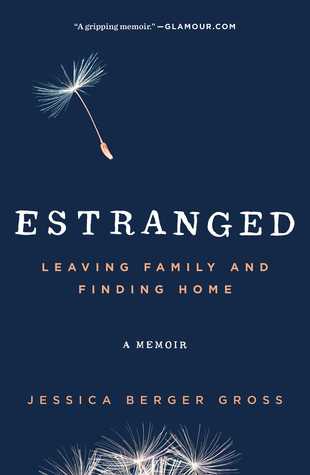
Estranged: leaving family and finding home by Jessica Berger Gross
There were so many mixed reviews of this book that I almost didn't read it. But, after reading it I think the issue with the reviews is whether or not you've experienced abuse or trauma. If you've never experienced that it might seem like she's spoiled or complaining or unreasonably angry (all things I read in reviews), but if you've experienced abuse or trauma you can see that she is trying to sort through everything and come out on the other side and in her case she was only able to do that by cutting off contact with her family. That's obviously not the outcome for everyone, but it was painfully obvious to me that her parents NEVER took responsibility for how they treated her - it was always "also" her fault. I think the worst part of the book for me was when her brother who had always protected her and looked out for her attacked her as an adult and also refused to take responsibility or go to therapy to deal with it. It's also obvious that Gross can see how terribly she sometimes behaved growing up, but how she struggled to change - so she's not trying to justify her behavior, but show how her upbringing led to some of her decisions or behavior.
Was this book The Glass Castle? No. But, it was still a good book about a difficult topic. One thing I'm curious about is now that this book has come out has her family tried to contact her? I would worry that they would show up at an author event or something. Despite the topic, the book is hopeful especially at the end. Good for her for creating the family and life for herself she always wanted.
Some quotes I liked:
"In that small hushed office in the Village, with the comforting sound of a noise machine and the view of a brick wall, I began to deal - truly deal - with my past. Not by offering up forgiveness to my parents, or by confronting them in any outward way at all, but by going inside and allowing myself to take in the seriousness and sadness of what had happened to me. It was grueling work." (p. 195)
"My parents had contaminated the first half of my life. I couldn't let them ruin the second." (p. 235)
"After that day I decided to change my life. Each morning I forced myself to meditate or bundle up and take a cold country walk. On my yoga mat, during long drives, in kitchen conversations with Neil, late at night when I couldn't sleep, while reading Eastern philosophy or writing in my journal, I contemplated the meaning of forgiveness. The real kind that has to do with acceptance and moving forward, not the bullshit forgive-and-forget package of lies I'd been trying to swallow for years." (p. 244)
Was this book The Glass Castle? No. But, it was still a good book about a difficult topic. One thing I'm curious about is now that this book has come out has her family tried to contact her? I would worry that they would show up at an author event or something. Despite the topic, the book is hopeful especially at the end. Good for her for creating the family and life for herself she always wanted.
Some quotes I liked:
"In that small hushed office in the Village, with the comforting sound of a noise machine and the view of a brick wall, I began to deal - truly deal - with my past. Not by offering up forgiveness to my parents, or by confronting them in any outward way at all, but by going inside and allowing myself to take in the seriousness and sadness of what had happened to me. It was grueling work." (p. 195)
"My parents had contaminated the first half of my life. I couldn't let them ruin the second." (p. 235)
"After that day I decided to change my life. Each morning I forced myself to meditate or bundle up and take a cold country walk. On my yoga mat, during long drives, in kitchen conversations with Neil, late at night when I couldn't sleep, while reading Eastern philosophy or writing in my journal, I contemplated the meaning of forgiveness. The real kind that has to do with acceptance and moving forward, not the bullshit forgive-and-forget package of lies I'd been trying to swallow for years." (p. 244)
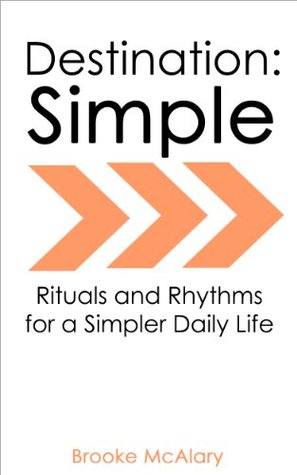
Destination: Simple rituals and rhythms for a simpler daily life by Brooke McAlary
I read McAlary's later book, Slow: simple living for a frantic world, earlier this year so I was excited to read this earlier one. My library only had the ebook format and I don't know if it was the format or what, but I just wasn't as drawn to this one. I know this is a book about simplicity, but it seemed a little TOO simple. Very basic, straightforward ideas for creating rituals and rhythms for your daily life. All good ideas, but I just got a lot more out of her other book. It also seemed like there should have been pictures or something, but the ebook didn't have any of that. Overall, it was a quick read about how to start simplifying your life.
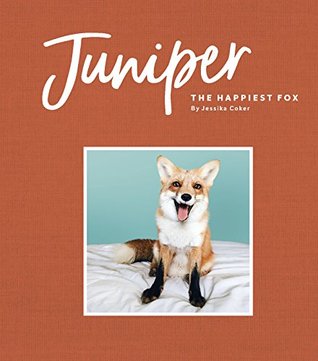
Juniper: the happiest fox by Jessika Coker
I love a good animal story - especially one with beautiful pictures to go along with it and Juniper does not disappoint. Jessika Coker always loved animals and even worked in animal sanctuaries. Because of how foxes are bred for fur if any are rescued from a fur farm they cannot go back into the wild because they are too tame and too removed from their original wildness. When Coker has the opportunity to adopt a fox kit she jumps on the chance. Juniper is the runt of the litter and instantly bonds with Coker and her dog Moose. Foxes are incredibly smart and Coker was always on her toes trying to fox-proof her house. While Juniper's story is (hopefully) far from over maybe there will be a sequel in the future. This was a very quick read - I read it in under an hour - with LOTS of beautiful photos of Juniper and Moose and Fig, a new fox addition at the end of the book. Definitely a great book to make you smile and learn more about foxes as well.
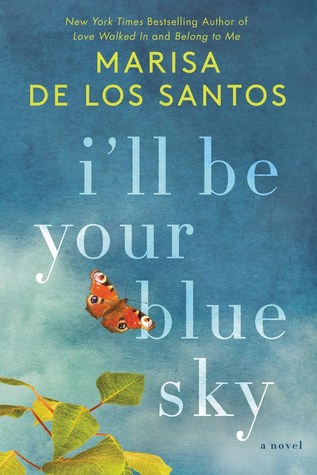
I'll Be Your Blue Sky by Marisa de los Santos
Clare Hobbes is about to marry Zach - a total catch in anyone's eyes. So, why is she still trying to convince herself that Zach is "The One"? During the festivities leading up to her wedding, Clare has a chance encounter with an older woman named Edith. Edith feels like a port in a storm to Clare, she listens to Clare and gives her some solid advice. Clare realizes that Zach is NOT "The One" and ends it. A few weeks later she finds out that Edith has died and left Clare a house at the beach in Delaware. Why would a stranger leave Clare a beach house? When Clare goes to the house she uncovers a mystery about Edith and while unraveling the mystery she finds that she and Edith are more connected than she could have imagined.
The story is told from both Clare and Edith's perspectives and goes back and forth in time for their stories. The mystery part and Edith's story are very compelling and you want to find out what happened and why. Two things I didn't like - 1) Domestic violence is a major theme in both women's stories and yet it's never clearly stated that Clare's former fiance was violent and emotionally abusive. I wish they had just stated the obvious there and made that connection to Edith's story. 2) There are quite a few parts of the story that work out a little too neatly. While I hate to be left hanging with a storyline having EVERYTHING work out just right is a little much sometimes. I think the story could have been just as compelling without the family connection to Edith, although that did help explain why she left the house to Clare. Overall, definitely a quick read and a good mystery and storyline. I could see this making a good movie too.
The story is told from both Clare and Edith's perspectives and goes back and forth in time for their stories. The mystery part and Edith's story are very compelling and you want to find out what happened and why. Two things I didn't like - 1) Domestic violence is a major theme in both women's stories and yet it's never clearly stated that Clare's former fiance was violent and emotionally abusive. I wish they had just stated the obvious there and made that connection to Edith's story. 2) There are quite a few parts of the story that work out a little too neatly. While I hate to be left hanging with a storyline having EVERYTHING work out just right is a little much sometimes. I think the story could have been just as compelling without the family connection to Edith, although that did help explain why she left the house to Clare. Overall, definitely a quick read and a good mystery and storyline. I could see this making a good movie too.
No comments:
Post a Comment